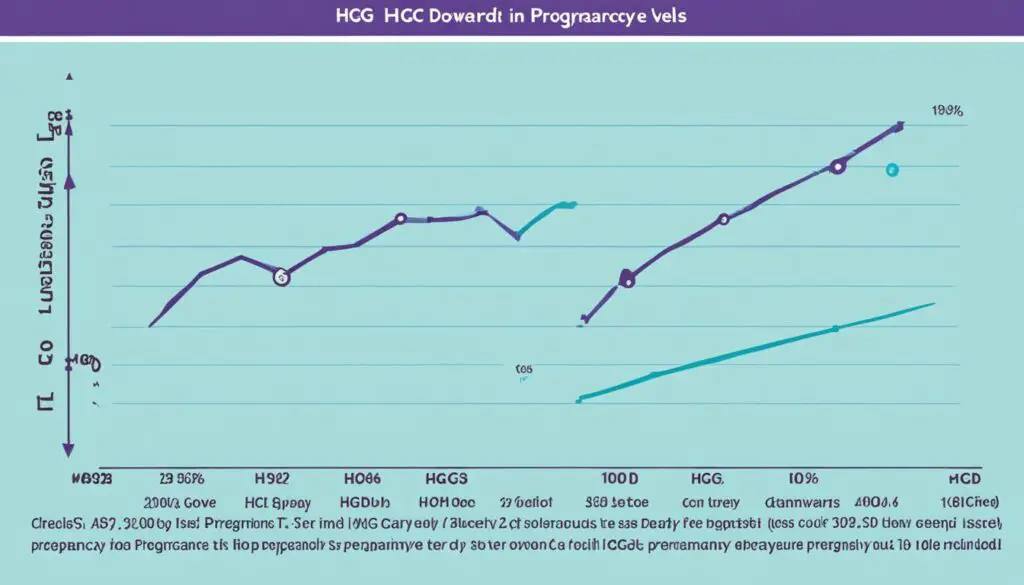Did you know that low levels of HCG, the hormone produced by the placenta during pregnancy, can indicate an underlying problem? However, it’s important to note that low HCG levels are not always a cause for concern. HCG levels can vary from woman to woman and can depend on factors such as the number of embryos being carried and the individual’s response to pregnancy.
So, what are the signs of dropping HCG levels and what solutions are available? In this article, we will explore everything you need to know about low HCG levels in pregnancy, including the causes, treatment options, and how to manage this situation effectively. Whether you’re a expecting mother or someone supporting a loved one, understanding HCG levels is crucial for a healthy pregnancy journey.
Key Takeaways:
- Low HCG levels in pregnancy can indicate an underlying problem but are not always a cause for concern.
- Signs of dropping HCG levels include vaginal bleeding, abdominal cramps, passing tissue or clots, cessation of pregnancy symptoms, and discharge of white or pink mucus.
- Possible causes of low HCG levels include miscalculated gestational age, miscarriage, blighted ovum, and ectopic pregnancy.
- Treatment options for dropping HCG levels depend on the underlying cause and may involve medication or surgical procedures.
- Regular monitoring of HCG levels and close communication with healthcare providers are essential for managing this situation effectively.
Understanding HCG Levels in Pregnancy
During pregnancy, it is essential to understand the fluctuations in HCG levels and their significance. HCG levels play a crucial role in monitoring the health and progression of the pregnancy. Let’s delve into the details of HCG levels dropping and the associated signs to watch out for.
The Importance of HCG Levels
HCG, or human chorionic gonadotropin, is a hormone produced by the placenta during pregnancy. This hormone serves as a vital indicator of the pregnancy’s well-being and development. HCG levels typically double every two to three days in the early stages of pregnancy. However, it is crucial to note that high initial HCG levels may not increase at the same rate as lower initial levels. If HCG levels fall below the normal range, it can indicate a potential problem with the pregnancy.
Signs of Dropping HCG Levels
When HCG levels drop, certain signs may manifest, signaling a potential issue with the pregnancy. It is important to be aware of the following signs:
- Vaginal bleeding
- Abdominal cramps
- Passing tissue or clots
- Cessation of pregnancy symptoms
- Discharge of white or pink mucus
Experiencing one or more of these signs may indicate that HCG levels are dropping. However, it is essential to remember that low HCG levels alone are not necessarily a reason to be overly worried. Many women with low HCG levels have had healthy pregnancies and delivered healthy babies.
The Image of HCG Levels in Early Pregnancy
Take a look at this image depicting the trajectory of HCG levels in the early stages of pregnancy:
Causes of Low HCG Levels in Pregnancy

When HCG levels drop during pregnancy, it can be a cause for concern. There are several potential reasons for this decline, including:
- Miscalculated Gestational Age: If a woman has irregular periods or is unsure of her dates, it can lead to a miscalculated gestational age. In such cases, ultrasound and further HCG tests can help determine the correct gestational age.
- Miscarriage: A miscarriage is the loss of a pregnancy before 20 weeks of gestation. Low HCG levels can be an indication of a miscarriage.
- Blighted Ovum: A blighted ovum occurs when a fertilized egg attaches to the uterus but fails to develop. This can result in low HCG levels.
- Ectopic Pregnancy: An ectopic pregnancy is a condition where the embryo implants outside the uterus, most commonly in the fallopian tube. It can cause low HCG levels and is a medical emergency. Symptoms include abdominal or pelvic pain, heavy vaginal bleeding, and shoulder pain.
It is essential to consult with a healthcare provider if experiencing low HCG levels during pregnancy to determine the underlying cause and appropriate course of action.
Ectopic Pregnancy
“An ectopic pregnancy is a serious medical condition that requires immediate attention. If you experience symptoms such as severe abdominal pain, heavy vaginal bleeding, or shoulder pain, seek medical help right away.”
Understanding the potential causes of low HCG levels can help individuals navigate the challenges associated with dropping HCG levels during pregnancy. By addressing the underlying factors and receiving proper medical care, it is possible to manage this situation effectively.
Treatment Options for Dropping HCG Levels
Unfortunately, there is no specific treatment for low HCG levels in pregnancy. However, certain interventions can help manage the situation and address underlying causes. The best course of action will depend on the individual situation, and it is essential to consult a healthcare provider for personalized guidance.
1. Miscarriage
In cases of miscarriage, treatment may be necessary to remove any remaining pregnancy tissue from the uterus. The method of treatment can vary and will depend on several factors, including the stage of the miscarriage and individual preferences. The following options are commonly considered:
- Natural passage: In some cases, the body can expel the pregnancy tissue naturally. However, this process can take several days or weeks, and the healthcare provider will closely monitor the individual’s condition.
- Medication: Medications such as misoprostol may be prescribed to help the uterus expel the remaining tissue.
- Surgical removal: In cases where natural passage or medication is not feasible or preferred, a surgical procedure called dilation and curettage (D&C) may be performed to remove the pregnancy tissue.
2. Ectopic Pregnancy
In the case of an ectopic pregnancy, where the embryo implants outside the uterus, prompt treatment is crucial to prevent complications. The primary goal of treatment is to remove the ectopic pregnancy and preserve the individual’s health. The following treatment options are typically considered:
- Medications: Methotrexate, a medication that stops the growth of the ectopic pregnancy, may be prescribed. This option is viable for individuals with stable conditions and smaller ectopic pregnancies.
- Surgery: Surgery may be necessary if the ectopic pregnancy is large, the fallopian tube is significantly damaged, or severe symptoms are present. The surgical procedure involves removing the affected fallopian tube and the pregnancy.
It is essential to note that the specific treatment options and recommendations may vary based on the individual’s circumstances. A healthcare provider will assess the situation and provide appropriate guidance.
Managing Dropping HCG Levels in Pregnancy

If low HCG levels are detected, it is important to
monitor them closely
to ensure they are increasing as expected. This may involve regular blood tests to track the levels over time. Additionally, addressing any underlying issues that may be causing the low HCG levels is essential for effective management.
One common cause of dropping HCG levels is a miscalculated gestational age. This can occur if a woman has irregular periods or is unsure of her dates. In such cases, an ultrasound and further HCG tests can help determine the correct gestational age. Adjusting the estimated due date based on accurate information can help manage the dropping HCG levels effectively.
Another potential cause of low HCG levels is an ectopic pregnancy, where the fertilized egg implants outside the uterus. If this is the case, seeking medical intervention is crucial. Medications can be given to prevent further growth of the pregnancy, and in some cases, surgery may be required to remove the affected fallopian tube and pregnancy.
Monitoring and managing dropping HCG levels in pregnancy requires a proactive approach. Regular communication with healthcare providers is essential to ensure appropriate measures are taken. By closely monitoring HCG levels, addressing underlying issues, and seeking medical intervention when necessary, individuals can effectively manage the dropping HCG levels and optimize their pregnancy outcomes.
Outlook for Low HCG Levels in Pregnancy
Low HCG levels alone are not always a cause for concern and do not necessarily indicate a negative outcome. The outlook for low HCG levels will depend on the individual circumstances and the underlying cause. It is important to remember that low HCG levels are not caused by anything the individual has done, and they are not necessarily indicative of future fertility problems. Even if a miscarriage or ectopic pregnancy occurs, it is still possible to get pregnant and carry to term in the future.
Individual Circumstances Matter
Every pregnancy is unique, and the interpretation of low HCG levels should take into account the individual’s specific situation. It is crucial to discuss the results with a healthcare provider who can provide personalized guidance and support.
Potential Outcomes
When low HCG levels are detected, several outcomes are possible:
- A continuing healthy pregnancy: Some women with low HCG levels go on to have healthy pregnancies and deliver healthy babies. Low HCG levels alone do not necessarily indicate a negative outcome.
- A miscarriage: In some cases, low HCG levels may be a sign of an impending miscarriage. It is important to remember that a miscarriage does not define future fertility.
- An ectopic pregnancy: Low HCG levels can also be a symptom of an ectopic pregnancy, where the fertilized egg implants outside the uterus. This is a potentially serious condition that requires medical attention.
Coping and Support
Dealing with the emotional impact of low HCG levels can be challenging. It is essential to seek emotional support from loved ones, healthcare professionals, or support groups. Remember that it is normal to feel a range of emotions during this time and that support is available to help navigate the ups and downs.
“Remember that low HCG levels do not define your worth as a person or your ability to have a successful pregnancy. Take the time to process your emotions and seek assistance if needed to help you through this journey.” – Dr. Sarah Johnson, Obstetrician
Moving Forward
No matter the outcome, it’s crucial to focus on self-care and maintaining a positive outlook. Taking care of physical and emotional well-being is essential for future pregnancies. Consult with a healthcare provider to discuss any concerns and develop a plan for the future.
| Outlook for Low HCG Levels | Potential Outcomes |
|---|---|
| A continuing healthy pregnancy | Low HCG levels alone do not necessarily indicate a negative outcome. |
| A miscarriage | While it can be emotionally challenging, a miscarriage does not define future fertility. |
| An ectopic pregnancy | Seek medical attention for an ectopic pregnancy, as it requires immediate intervention. |
The Importance of Early Detection and Monitoring

Early detection and monitoring play a crucial role in ensuring a healthy pregnancy. By closely monitoring HCG levels, healthcare providers can identify any potential issues that may arise and take necessary actions in a timely manner. Regular blood tests and ultrasound examinations are effective tools in providing valuable information about the progress of the pregnancy and the well-being of the fetus.
Early identification of dropping HCG levels in early pregnancy can indicate a problem that requires attention. If HCG levels are not rising as expected or are dropping, it is essential to investigate further to determine the root cause and appropriate course of action. By taking immediate steps, healthcare providers can intervene to safeguard the health of the mother and the baby.
Early detection allows for timely intervention and better outcomes for both the mother and the baby.
Regular Blood Tests for HCG Levels
Blood tests are widely used to measure HCG levels in pregnancy. They provide a more accurate measurement compared to urine tests. By tracking HCG levels over time, healthcare providers can monitor the progress and development of the pregnancy and detect any abnormalities or potential complications.
- Regular blood tests ensure that any drop in HCG levels is promptly identified.
- Consistent monitoring helps healthcare providers assess the health of the pregnancy and make informed decisions.
Ultrasound Examinations for a Comprehensive Assessment
Ultrasound examinations are another valuable tool in monitoring the health of the pregnancy. They allow healthcare providers to visualize the fetus, check for any developmental issues, and assess the overall well-being of the baby.
- Regular ultrasound examinations complement HCG level monitoring, providing a comprehensive assessment.
- Ultrasounds help healthcare providers detect any potential complications early on, increasing the chances of successful interventions.
By combining regular blood tests and ultrasound examinations, healthcare providers can gain a comprehensive understanding of the pregnancy’s progress and address any concerns promptly. This approach enables them to provide the best possible care for both the mother and the baby.
| Benefits of Early Detection and Monitoring | |
|---|---|
| 1. Timely identification of potential issues | Early detection allows healthcare providers to take necessary actions promptly to ensure the best possible outcome. |
| 2. Enhanced decision-making | Regular monitoring provides healthcare providers with crucial information for making informed decisions regarding the pregnancy’s management. |
| 3. Improved outcomes | By closely monitoring HCG levels and the pregnancy’s progress, healthcare providers can optimize care and increase the chances of a healthy pregnancy and delivery. |
Understanding the Normal Range of HCG Levels

The normal range of HCG levels can vary widely from woman to woman and throughout the stages of pregnancy. Standard HCG levels range from 5-50 mIU/mL in 3 weeks of pregnancy to 3,640-117,000 mIU/mL in 25-40 weeks of pregnancy. These levels are measured in milli-international units of HCG hormone per milliliter of blood (mIU/mL).
It is important to note that these ranges are general guidelines and individual levels may vary. Consultation with a healthcare provider is recommended for a more accurate understanding of HCG level ranges.
Normal Range of HCG Levels During Pregnancy
| Weeks of Pregnancy | HCG Level Range (mIU/mL) |
|---|---|
| 3 | 5-50 |
| 4 | 5-426 |
| 5 | 18-7,340 |
| 6 | 1,080-56,500 |
| 7-8 | 7,650-229,000 |
| 9-12 | 25,700-288,000 |
| 13-16 | 13,300-254,000 |
| 17-24 | 4,060-165,400 |
| 25-40 | 3,640-117,000 |
Note: The values in the table are approximate and may vary for each individual.
“Understanding the normal range of HCG levels is crucial in monitoring the progress of a pregnancy and assessing the health of both the mother and the fetus.”
The Emotional Impact of Low HCG Levels

Coping with dropping HCG levels during pregnancy can have a profound emotional impact on individuals. Discovering that HCG levels are low can evoke feelings of anxiety, fear, sadness, and uncertainty, as it may indicate a potential loss or complication in the pregnancy. It is essential for individuals experiencing this situation to seek emotional support from loved ones, healthcare professionals, or support groups.
Having a strong support system is crucial during this challenging time. Loved ones can provide a listening ear, offering empathy and understanding. They can offer reassurance and help create a safe space where individuals can express their emotions openly. Healthcare professionals, such as obstetricians, gynecologists, or therapists, are also valuable sources of support in navigating the emotional impact of low HCG levels. These professionals can provide guidance, answer questions, and offer appropriate strategies for managing emotional distress.
Support groups specifically designed for individuals experiencing similar situations can be immensely beneficial. Connecting with others who have gone through or are going through the same emotional journey can provide a sense of comfort, validation, and understanding. These support groups can serve as a platform for sharing experiences, exchanging coping mechanisms, and finding solace in the knowledge that one is not alone.
I felt a whirlwind of emotions when I found out my HCG levels were dropping. It was devastating, and I couldn’t help but blame myself. Thankfully, with the support of my partner and my healthcare team, I learned that low HCG levels are not a reflection of personal failure. They reminded me that there are often factors beyond our control, and I didn’t have to go through it alone. Seeking emotional support was a turning point for me, and it helped me cope with the roller coaster of emotions.
Understanding that low HCG levels are not necessarily indicative of personal failure is a crucial aspect of managing the emotional impact. It is essential to recognize that pregnancy complications can occur even without any fault or action on the part of the individual. Many factors, both known and unknown, contribute to the development of a pregnancy, making it a complex and delicate process.
By acknowledging that low HCG levels are often beyond one’s control, individuals can begin to let go of feelings of guilt and self-blame. This shift in perspective allows for a healthier emotional response and promotes a sense of self-compassion and resilience during this challenging time.
Remember:
- Reach out to loved ones for emotional support.
- Seek guidance from healthcare professionals or therapists.
- Connect with support groups for individuals experiencing similar situations.
- Understand that low HCG levels do not necessarily imply personal failure.
- Cultivate self-compassion and resilience in the face of emotional challenges.
| HCG Level | Emotional Implications |
|---|---|
| Normal HCG Levels | Relief and reassurance |
| Dropping HCG Levels | Anxiety, fear, sadness, uncertainty |
| Understanding the Cause | Mixed emotions – relief if underlying cause is identified and treatable; concern if complications or loss are detected |
| Support and Coping | Emotional support systems, therapy, support groups – bringing comfort, validation, and coping strategies |
| Acceptance and Resilience | Gaining acceptance, letting go of self-blame, cultivating resilience |
Conclusion
In conclusion, low HCG levels in pregnancy can be a cause for concern but are not always indicative of a negative outcome. It is important to understand the potential causes of dropping HCG levels and the available treatment options to effectively manage this situation. Regular monitoring of HCG levels and close communication with healthcare providers are essential in ensuring the best possible outcome. Remember, each pregnancy is unique, and the outlook for low HCG levels will depend on individual circumstances.
FAQ
What are the signs of dropping HCG levels in pregnancy?
Signs of dropping HCG levels in pregnancy may include vaginal bleeding, abdominal cramps, passing tissue or clots, cessation of pregnancy symptoms, and discharge of white or pink mucus.
What can cause HCG levels to drop during pregnancy?
There are several potential causes of low HCG levels in pregnancy, including a miscalculated gestational age, a miscarriage, a blighted ovum, or an ectopic pregnancy.
Are there any treatment options for dropping HCG levels in pregnancy?
There is no specific treatment for low HCG levels in pregnancy. However, treatment options may be needed for complications such as a miscarriage or an ectopic pregnancy.
How can I manage dropping HCG levels in pregnancy?
Managing dropping HCG levels in pregnancy involves close monitoring of the levels, addressing any underlying issues, and following the recommendations of healthcare providers.
What is the outlook for low HCG levels in pregnancy?
The outlook for low HCG levels in pregnancy will depend on the individual circumstances and the underlying cause. Consultation with a healthcare provider is recommended to determine the best course of action.
Why is early detection and monitoring of HCG levels important?
Early detection and monitoring of HCG levels in pregnancy can help identify any potential issues and allow for timely intervention if necessary.
What is the normal range of HCG levels in pregnancy?
Standard HCG levels range from 5-50 mIU/mL in 3 weeks of pregnancy to 3,640-117,000 mIU/mL in 25-40 weeks of pregnancy. It is important to note that individual levels may vary.
How can I cope with the emotional impact of low HCG levels?
Coping with low HCG levels can be emotionally challenging. Seek emotional support from loved ones, healthcare professionals, or support groups to help manage the emotional impact.
What are the conclusions about dropping HCG levels in pregnancy?
Low HCG levels in pregnancy can be a cause for concern but are not always indicative of a negative outcome. The outlook will depend on the individual circumstances and the underlying cause.




